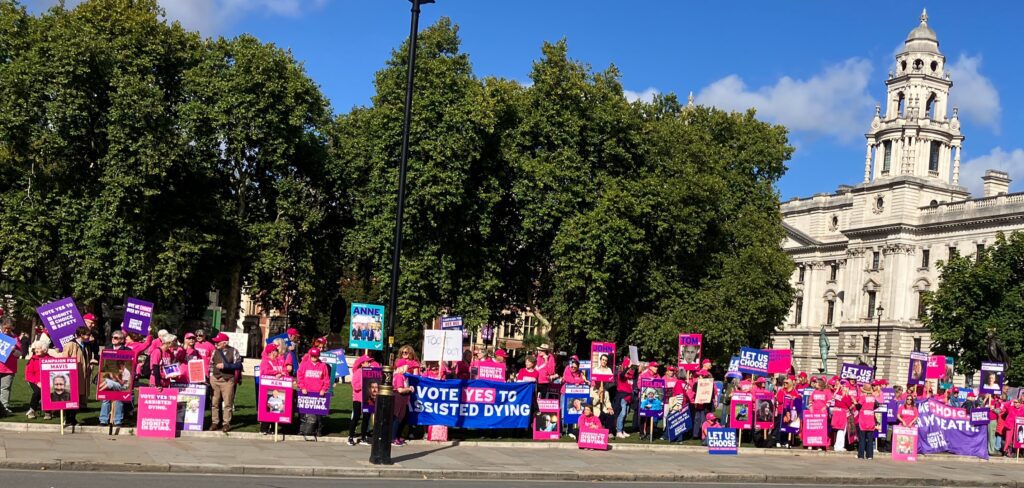The assisted dying bill has already been passed by the Commons, but it’s not out of the woods completely yet – it’s now up to the Lords to give it their stamp of approval.
Friday [12th September] saw the House of Lords sit for the second reading of the Terminally Ill Adults (End of Life) Bill.
The bill was introduced by Labour MP Kim Leadbeater as a Private Members’ Bill last year, and passed through the Commons by a narrow margin of just 23 votes in June.
What is the assisted dying bill?
The bill proposes that terminally ill adults in England and Wales would be able to apply for an assisted death if they were judged to have six months or less to live and had the mental capacity to make the decision.
Their decision would need to be signed off by a multi-disciplinary panel comprising of a social worker, psychiatrist and legal professional, after initial sign off from two doctors.
The bill is a private members’ bill, meaning it was not introduced by the Labour government, but rather by MP Kim Leadbeater in the Commons and Lord Charlie Falconer in the Lords. It does not have a party affiliation, and there is support for and against the legislation on all sides of the political spectrum.
Why is it now in the Lords?
Under the UK parliamentary system, all bills must be approved by both the House of Commons and the House of Lords to be signed into law.
The assisted dying bill passed through all of its stages in the Commons narrowly in June, but it has yet to complete the legislative process in the House of Lords.
This leaves open the possibility of the Lords refusing to pass the bill, meaning that it would not become law in England and Wales.
If the Lords did block the bill this would likely be highly controversial – an unelected chamber blocking the desire of a democratically elected chamber.
What was said in the debate?
The debate on Friday was kicked off by Lord Charlie Falconer, the sponsor of the bill in the House of Lords. This bill is his seventh attempt to change the law on assisted suicide.
Falconer kicked off the debate by describing the bill as: “The most safeguarded assisted dying measure in the world.” He also called on the Lords to: “Respect the primacy of the Commons.”
“The public want this and the elected House has expressed its will.”
Of all comments in the debate, the one that has attracted the most media attention is the intervention by former Tory PM Theresa May, who said: “I have a friend who calls it the “Licence to Kill Bill”.”
“Suicide is wrong. This Bill is wrong. It should not pass.”
She was joined by many other peers in opposition to the bill, including former paralympian and disability activist Baroness Tanni Grey-Thompson. Baroness Grey-Thompson stated that the Bill: “Blurs the line between assisted dying and euthanasia.”
The key difference between assisted dying and euthanasia is in who administers the lethal drugs. In assisted dying, it is the patient that administers the drugs to themselves, whereas in euthanasia it is a doctor that does so.
Others raised concerns about the potential impacts of the bill on vulnerable people – Baroness Margaret Ritchie stated that: “The Bill poses an inherent risk to the elderly and disabled.”
This view was shared by the Lord Bishop of London, Sarah Mullally, who said that: “To change the law is to change society.”
“The Bill will signal that we are a society that believes that some lives are not worth living.”
Not all peers were opposed however, with many weighing in on the side of the legislation.
Lord Michael Dobbs, former Tory MP and author, stated that: “The current law is cruel and untenable.”
Many peers also shared personal stories in the debate.
Labour peer Lord Brendan Barber shared the story of Daniel Monks, son of fellow Labour peer Lord John Monks, who suffered from multiple sclerosis, and “starved himself to death” as he was not able to access assisted dying in the UK.
“If the bill is not passed, countless people will continue to suffer painful, horrific, undignified deaths.”
The debate lasted nearly six and a half hours in total, testament to the strength of feeling on both sides.
What next?
Friday saw the first of two days of debate on the bill in the Lords, with the next full day of debate to come on Friday 19th September.
Following this further day of debate, the bill will return to the Lords and peers will be able to suggest amendments. What these will be is yet to be seen, but are likely to cover concerns over coercion and the exact process that people will have to go through to access assisted dying.
As a private members’ bill, the bill will need to complete all of its parliamentary stages in the Lords by the end of the parliamentary term in the spring or it will run out of time without intervention from Starmer’s government.
Featured image via Anna Mardling.




